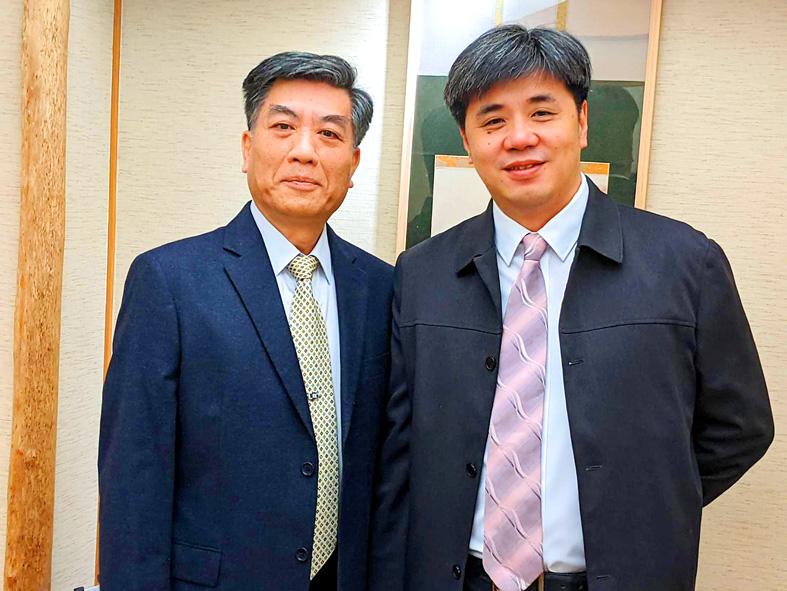Optical filter maker Kingray (晶瑞光電) yesterday said it plans to raise capital to purchase equipment to massively expand production after it becomes an approved vendor for STMicroelectronics NV.
“Getting that vendor code was a very difficult process,” Kingray chief executive officer Leo Tsou (鄒政興) said, adding that STMicroelectronics would be a “key client.”
STMicroelectronics is the maker of time-of-flight (TOF) modules for Apple Inc, among other clients. TOF modules require a narrow band pass filter (NBPF) to isolate the infrared wavelength, which is optimal for facial recognition.

Photo: Bill Chen, Taipei Times
“Each cellphone has three kinds of eyes,” Tsou said, “The camera, the TOF and the ambient light sensor [ALS].”
Kingray makes filters for TOFs and ambient light sensors, although Tsou said he has ambitions to break into the camera filter market, too.
“The problem now is that we cannot compete with the Chinese camera filters on price, but we are working on making our filters smaller and thinner so that we can differentiate ourselves from our competitors,” he said.
Kingray has facilities are in Hsinchu County’s Jhudong Township (竹東).
Tsou said the company plans to first rent, then build more plants to increase production, which would remain in Taiwan.
“We have no intentions of moving to China, it is too risky from a trade-secrets point of view,” Tsou said. “Meanwhile, other countries, such as those in Southeast Asia, do not have the highly skilled workforce we require.”
The global market for NBPFs is dominated by US firm Viavi Solutions Inc. A key to Kingray’s ability to break into this market was two years of research and development, culminating in a new patent. Kingray’s patent is accepted in Taiwan, China, Japan and Germany, although not yet in the US.
“Getting our own patent was essential to having clients’ design in our product,” Tsou said, adding that the company also has four other patents pending, and hope to file another one this year related to a semiconductor process.
While optics and semiconductors might seem like very different fields, Tsou said combining the “eyes” and the “brains” would be essential to the robots of the future.
“Our human eyes are incredible at picking out what is important and judging distance — all things that machines cannot do until they integrate the optical with the electronics,” he said.
Kingray, founded in 1999, started as a dicer of semiconductor wafers and ceramic boards. Currently, it mostly produces optical filters.
It reported revenue of NT$19.40 million for last year, up 136 percent from 2019, but it is not currently profitable.
“We are hoping to reach profitability possibly in the third quarter of 2021,” chief financial officer Rio Lai (賴俊文) said.
The company is slated to debut on the Emerging Stock Board at the suggested price NT$25 a share tomorrow.

Intel Corp chief executive officer Lip-Bu Tan (陳立武) is expected to meet with Taiwanese suppliers next month in conjunction with the opening of the Computex Taipei trade show, supply chain sources said on Monday. The visit, the first for Tan to Taiwan since assuming his new post last month, would be aimed at enhancing Intel’s ties with suppliers in Taiwan as he attempts to help turn around the struggling US chipmaker, the sources said. Tan is to hold a banquet to celebrate Intel’s 40-year presence in Taiwan before Computex opens on May 20 and invite dozens of Taiwanese suppliers to exchange views

Application-specific integrated circuit designer Faraday Technology Corp (智原) yesterday said that although revenue this quarter would decline 30 percent from last quarter, it retained its full-year forecast of revenue growth of 100 percent. The company attributed the quarterly drop to a slowdown in customers’ production of chips using Faraday’s advanced packaging technology. The company is still confident about its revenue growth this year, given its strong “design-win” — or the projects it won to help customers design their chips, Faraday president Steve Wang (王國雍) told an online earnings conference. “The design-win this year is better than we expected. We believe we will win

Quanta Computer Inc (廣達) chairman Barry Lam (林百里) is expected to share his views about the artificial intelligence (AI) industry’s prospects during his speech at the company’s 37th anniversary ceremony, as AI servers have become a new growth engine for the equipment manufacturing service provider. Lam’s speech is much anticipated, as Quanta has risen as one of the world’s major AI server suppliers. The company reported a 30 percent year-on-year growth in consolidated revenue to NT$1.41 trillion (US$43.35 billion) last year, thanks to fast-growing demand for servers, especially those with AI capabilities. The company told investors in November last year that

Power supply and electronic components maker Delta Electronics Inc (台達電) yesterday said it plans to ship its new 1 megawatt charging systems for electric trucks and buses in the first half of next year at the earliest. The new charging piles, which deliver up to 1 megawatt of charging power, are designed for heavy-duty electric vehicles, and support a maximum current of 1,500 amperes and output of 1,250 volts, Delta said in a news release. “If everything goes smoothly, we could begin shipping those new charging systems as early as in the first half of next year,” a company official said. The new